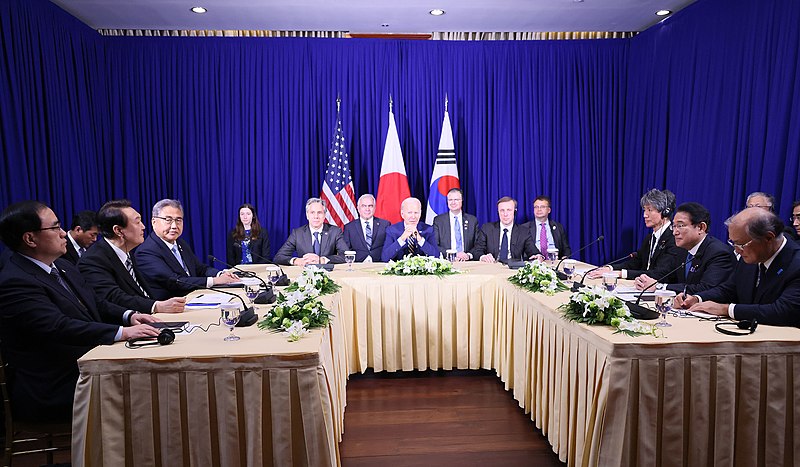South Korean President Yoon Suk-yeol and Japanese Prime Minister Fumio Kishida pledged cooperation during the summit that took place this week. The summit in Tokyo comes amidst flared tensions in the region due to North Korea’s missile launches.
On Thursday, Yoon and Kishida pledged to improve relations between the two countries known to have strained ties dating back to Japan’s occupation of Korea from 1910 to 1945. The summit also marked the first visit to Japan by a South Korean president in 12 years and underlined the deepening relations between the two US allies over the shared challenges brought by Pyongyang and its increasing missile launches and China’s growing influence on the international stage.
During the summit, Japan and South Korea agreed to drop a long-running trade dispute on some materials used for chips, despite the increased political importance of semiconductors and the securing of the supply. Both countries also agreed to revive the regular bilateral visits and restart the security dialogue that was put on hold in 2018.
Yoon also declared the “complete normalization” of an intelligence-sharing agreement with Japan, known as GSOMIA. Japan also agreed to remove the curbs on some exports to South Korea of critical components for smartphone displays and chips that were imposed in 2019. Seoul will also drop a World Trade Organization complaint against Tokyo, according to officials from both countries.
The United States praised the summit and referred to Japan and South Korea as “indispensable allies.” China, however, criticized the summit, with its foreign ministry saying that certain countries were trying to form exclusive circles.
Top Japanese and South Korean businesses had also agreed on improving ties and working closely on chips and technology when Yoon met with executives from both countries in Tokyo on Friday.
Yoon said regarding the meeting that there was “a lot of room for cooperation” between the two countries on semiconductors, batteries, and electric vehicles.
“Both governments will do everything to create opportunities to interact and do business with each other,” said Yoon.
The business lobbies of both countries said they would jointly back a “future-oriented” fund or around $1.5 million for research into acquiring rare resources, addressing supply chain issues, and youth exchanges.



 Trump Says “Very Good Talks” Underway on Russia-Ukraine War as Peace Efforts Continue
Trump Says “Very Good Talks” Underway on Russia-Ukraine War as Peace Efforts Continue  TrumpRx Website Launches to Offer Discounted Prescription Drugs for Cash-Paying Americans
TrumpRx Website Launches to Offer Discounted Prescription Drugs for Cash-Paying Americans  U.S.-India Trade Framework Signals Major Shift in Tariffs, Energy, and Supply Chains
U.S.-India Trade Framework Signals Major Shift in Tariffs, Energy, and Supply Chains  Trump Signs “America First Arms Transfer Strategy” to Prioritize U.S. Weapons Sales
Trump Signs “America First Arms Transfer Strategy” to Prioritize U.S. Weapons Sales  China Warns US Arms Sales to Taiwan Could Disrupt Trump’s Planned Visit
China Warns US Arms Sales to Taiwan Could Disrupt Trump’s Planned Visit  U.S. Lawmakers to Review Unredacted Jeffrey Epstein DOJ Files Starting Monday
U.S. Lawmakers to Review Unredacted Jeffrey Epstein DOJ Files Starting Monday  Iran–U.S. Nuclear Talks in Oman Face Major Hurdles Amid Rising Regional Tensions
Iran–U.S. Nuclear Talks in Oman Face Major Hurdles Amid Rising Regional Tensions  NATO to Discuss Strengthening Greenland Security Amid Arctic Tensions
NATO to Discuss Strengthening Greenland Security Amid Arctic Tensions  South Korea Assures U.S. on Trade Deal Commitments Amid Tariff Concerns
South Korea Assures U.S. on Trade Deal Commitments Amid Tariff Concerns  TrumpRx.gov Highlights GLP-1 Drug Discounts but Offers Limited Savings for Most Americans
TrumpRx.gov Highlights GLP-1 Drug Discounts but Offers Limited Savings for Most Americans  Trump Endorses Japan’s Sanae Takaichi Ahead of Crucial Election Amid Market and China Tensions
Trump Endorses Japan’s Sanae Takaichi Ahead of Crucial Election Amid Market and China Tensions  Norway Opens Corruption Probe Into Former PM and Nobel Committee Chair Thorbjoern Jagland Over Epstein Links
Norway Opens Corruption Probe Into Former PM and Nobel Committee Chair Thorbjoern Jagland Over Epstein Links  U.S. to Begin Paying UN Dues as Financial Crisis Spurs Push for Reforms
U.S. to Begin Paying UN Dues as Financial Crisis Spurs Push for Reforms  Pentagon Ends Military Education Programs With Harvard University
Pentagon Ends Military Education Programs With Harvard University  U.S. Announces Additional $6 Million in Humanitarian Aid to Cuba Amid Oil Sanctions and Fuel Shortages
U.S. Announces Additional $6 Million in Humanitarian Aid to Cuba Amid Oil Sanctions and Fuel Shortages  Trump Rejects Putin’s New START Extension Offer, Raising Fears of a New Nuclear Arms Race
Trump Rejects Putin’s New START Extension Offer, Raising Fears of a New Nuclear Arms Race  Ohio Man Indicted for Alleged Threat Against Vice President JD Vance, Faces Additional Federal Charges
Ohio Man Indicted for Alleged Threat Against Vice President JD Vance, Faces Additional Federal Charges 































